
Of all the technologies developed in recent years to reduce our reliance on fossil fuels and non-renewable resources, solar power is the big winner for domestic consumers. Solar panels are now a common sight on roofs across the land. Energy doesn’t really get much greener or cleaner than solar, and the price is going down year on year – so are you ready to make the move?
It’s not quite as simple as sticking some panels on your roof. The place to start is to assess your household’s energy needs. Are you looking for solar power to generate electricity for general home use? Or just for heating water? Solar water heaters are the most popular choice at present, though there are advantages to generating your own solar-powered electricity.
In terms of a cost-benefit analysis, the outlay for a solar water heater is less, but with solar panels for electricity you could cash in by selling excess electricity generated back to the grid. Both should pay you back in energy bill savings within a few years. Before you decide, its worth checking out subsidies and tax incentives available in your state or city. Leasing is a new option available to people wanting solar power but without the budget to buy outright. If you’re hoping to get state or federal tax credits make sure that leasing rather than buying doesn’t disqualify you from getting them.
The system you choose will also depend on where you are (how much sunlight you receive) and the design of your home. If you live in a sun-drenched part of the country it will be less of an issue but, especially if it’s cloudy often, installation that is optimized for catching sunlight can be vital. Employing a solar installation assessor is the way to go when calculating costs and savings.
Does your roof face the right way? Is the angle correct to maximize your use of the free radiant energy from the sun? Have you got enough roof space available to make it all worthwhile? You’ll get about 1 kilowatt of power for every 80 square feet of solar panelling. Think 4-800 square feet for it to be practical for the average household.
Solar power doesn’t just have to be on the roof. If your residence isn’t suitable for it you can have ground mounted panels if you have the space in the yard, though this is the less visually pleasing alternative. It can be ideal if you aren’t looking for solar to heat your water or power your home. Solar is a great option for heating swimming pools and greenhouses. If you can go all the way with electric panels for domestic electricity, a system will last you up to 30 years, boost the value of the property and save you big over that time.

